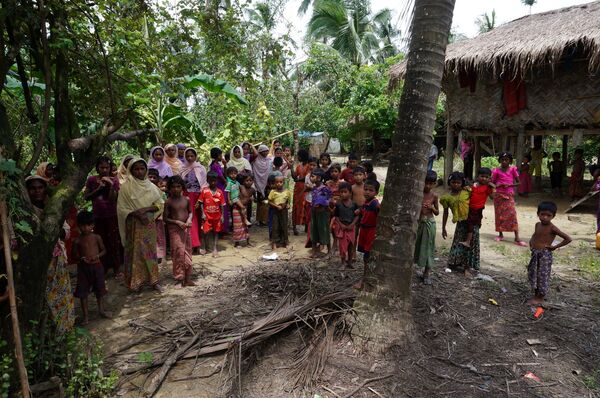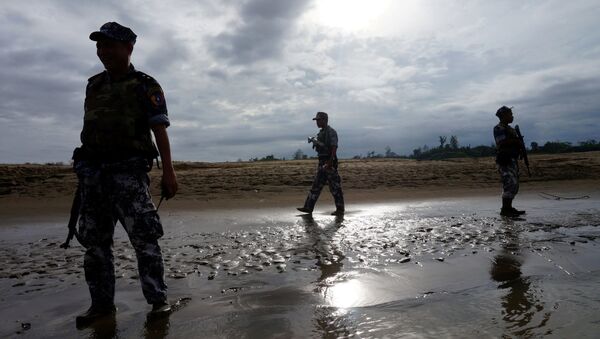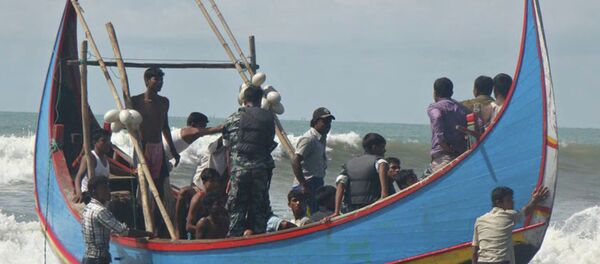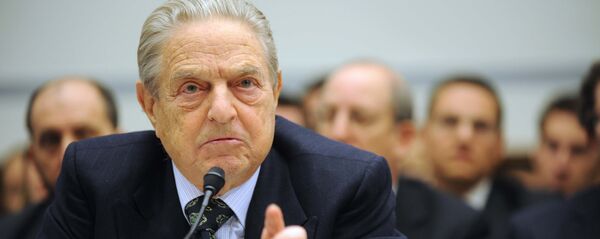The latest upsurge in violence in Myanmar's state of Rakhine is the worst in the history of the country's Rohingya minority, Chris Lewa, director of The Arakan Project, a nonprofit organization monitoring the situation on the ground in Rakhine State, told Radio Sputnik.
According to Lewa, what is going on is not just a "communal clash between Buddhists and Muslims": Government security forces "have launched a very brutal counter-insurgency operation after Rohingya insurgents had attacked a number of police posts and army camps on August 25."
As a result of the turmoil in Rakhine State many people were killed while thousands of Rohingya refugees have fled to Bangladesh.
Additionally, the humanitarian situation continues to worsen, Lewa noted, referring to the Myanmarese government's suspension of UN aid deliveries to the northern part of the country's state of Rakhine.
"Due to violence and, especially, arson attacks many people has lost their homes; they are trying to flee, they are hiding to the jungle. We have tens of thousands of internally displaced now," the scholar said.
Rohingya Conflict: Ethnic Clashes Run Deep in Myanmar's History
Lewa explained that over the decades the Rohingya Muslims have been regarded as outsiders by the native population of Rakhine, adding that the Rohingyas have no civil rights and remain "foreigners" in Myanmar despite the fact that they have inhabited the region for more than a century.
The scholar noted that ethnic clashes in Rakhine occurred many times before with refugees flowing into neighboring Bangladesh in the 1970s and the 1990s.
However, since 2010 the Rohingya crisis has intensified and developed into "communal violence" between Muslims and Buddhists, who apparently have sought to expel the Rohingyas out of the Rakhine State, according to Lewa.
The development coincided with the wave of clashes between Rohingya insurgents, who raided the state's border posts and Myanmar's counterinsurgency forces.
According to Lewa, the latest outbreak of violence, dubbed by the scholar as "the worst in history," should be stopped as soon as possible.
"I think the most urgent [issue] right now is to get the security forces to stop this operation," the scholar suggested, explaining that "arresting insurgents is one thing," while targeting civilians is another.
Urgent humanitarian access to all the communities and people affected by the ongoing clashes in the Rakhine province needs be provided, and certain steps should be made to resolve the longstanding conflict with Kofi Annan's recommendations implemented, the scholar told Radio Sputnik.
Earlier, the commission led by Annan urged the government to lift restrictions on the movement and citizenship rights of Myanmar's Rohingya minority, warning that the "stateless community" may soon become "more vulnerable to recruitment by extremists."

Is Latest Rohingya Crisis Part of 'Externally-Provoked Hybrid War'?
However, the situation is not as easy as it seems, some experts say.
According to the academic, the Rohingya crisis could have been externally fanned to exert pressure on China, which has made considerable investments in Rakhine energy projects and to sow discord among ASEAN nations, which have demonstrated swift economic growth over recent years.
Andrew Korybko, a political analyst, journalist and a regular contributor to Sputnik, opined in his latest article that the Rohingya conflict could be an "externally provoked identity-centric hybrid war" waged "through a coordinated and one-sided information campaign."
Meanwhile, on Wednesday, UN Secretary-General Antonio Guterres called upon Naypyidaw "to take determined action to put an end to this vicious cycle of violence."
For its part, the Russian Foreign Ministry called upon Myanmar to make every effort to ensure peace in the country and condemned the raids conducted by the so-called Rakhine Rohingya Salvation Army insurgents against police stations and army units.
"Like all responsible members of the international community, we call upon the Myanmar government… to try with maximum effort possible to ensure that the situation remains peaceful. We strongly condemn the attacks of militants against government forces. We call upon all parties concerned to exercise restraint," Russian Deputy Foreign Minister Igor Morgulov told journalists Wednesday.
The Rohingya crisis started on August 25 when Muslim insurgents of Rohingya origin attacked security posts in Myanmar's Rakhine State. The tough response by the country's authorities triggered violent clashes, which claimed the lives of at least 402 people.
The conflict that started about a century ago has gradually escalated since 2011, hitting its peak in 2012 when thousands of Muslim families sought asylum in special refugee camps on the country's territory or fled to Bangladesh. Yet another escalation started in 2016.




